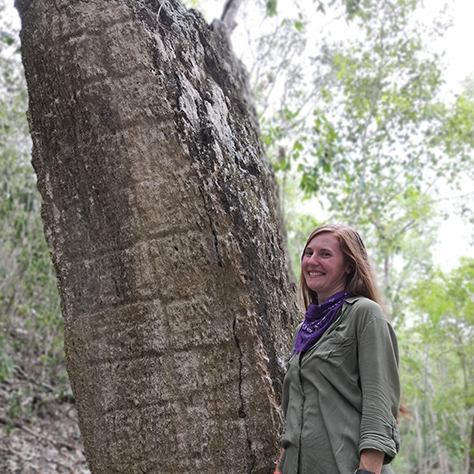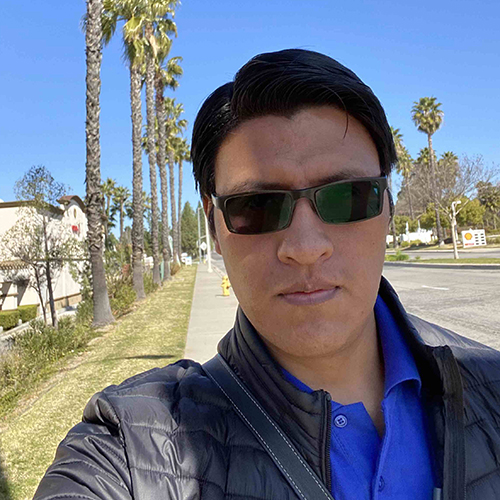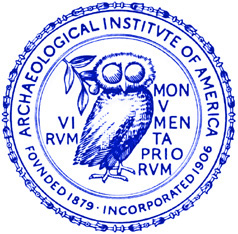
Kelsey Sullivan: Biography
Kelsey J. Sullivan is a Ph.D. candidate in the University of California, Riverside’s Department of Anthropology. She received her B.A. in Anthropology from the University of Oregon (UO) in 2011. Following her B.A., she worked at the Coastal Archaeology and Archaeometry Laboratory, a branch of the Museum of Natural and Cultural History at UO. Between 2015 and 2017, Kelsey completed her M.A. in Anthropology from Northern Arizona University. Her master’s thesis focused on caches of eccentric lithics from the Maya site of Xunantunich in Belize. Her archaeological work has focused on ritual and quotidian lithic technology. She has worked on archaeological projects in Belize and Mexico, as well as the Great Basin, the Northern Channel Islands of California, and Rapa Nui (Easter Island, Chile). Kelsey’s current research is in the hinterlands of the ancient Maya site of El Palmar in southeastern Campeche, where she examines the role of large-scale lithic production in community socioeconomic dynamics.
Kelsey Sullivan: Project Summary
Kelsey’s dissertation research examines the relationship between ancient Maya craft specialization and social inequality during the Classic period (250-900 CE). Specifically, the research investigates whether various degrees of participation in large-scale stone-tool production created inequalities among households. She will conduct research at the archaeological site of Took’ Witz, located near El Palmar in Campeche, Mexico. Took’ Witz was a small rural community with one of the largest stone tool industries in the Maya area. While the massive scale of production suggests many people made tools, it is not yet known how wealth was formed and distributed throughout the community. In this project, Kelsey will examine whether disparities in wealth existed between households near stone tool workshops and those farther away. She will conduct shovel testing and excavations of three plazuelas (i.e., households). In addition, she will complement field methods with laboratory testing including archaeobotanical analysis and AMS carbon dating. Funding from the Archaeological Institute of America-OC Society will enhance this research by providing funding for soil chemistry analysis of plaza floors and midden contexts.

Juan Chavez: Biography
Juan is an indigenous Ph.D. student at UC Riverside and a research associate at Universidad Mayor de San Andrés. He earned his Licenciatura degree in Archaeology from UMSA (2010), a Master’s degree in Ecumenical Studies from Université de Geneve (2012), and a Master’s degree in Anthropology from UCR (2020). Juan’s multidisciplinary approach draws from archaeology, ethnohistory, and social theory to discuss cultural interaction and biological relatedness in transition zones across his home country, Bolivia. His scholarship contributes to telling the stories of past and present-day indigenous peoples inhabiting contrasting environments ranging from the Andean highlands to the Amazonian lowlands.
Juan Chavez: Project Summary
Communities and Networks in the Bolivian Tropical Mountains during the Middle Horizon (ca. CE 600-900): A Bioarchaeological Study of Migration
Juan’s dissertation research studies migration in the Bolivian tropical mountains when small-scale Mojocoya societies interacted with the pan-Andean Tiwanaku State (ca. CE 600-900). Moving beyond vertical control models assuming that highland-based societies controlled lower areas through direct migration practices, Juan proposes that lowland-based communities articulated long-distance networks with the highlands using multiple migration strategies without the intervention of a State. He uses biodistance, cranial modification, and isotope analyses on multi-sited cranial collections to assess biological and cultural relatedness within and between the ecologically distinct tropical mountains, eastern valleys, and altiplano (i.e., high, flat plain) regions. The 2022 AIA-OC Grant will be used to run isotope analysis on selected dental and bone samples to identify potential migrants, their points of origin, and mobility patterns using spatial and temporal scales. The results will expand the understanding of migration strategies negotiated between small-scale societies and the State in the pre-contact Andes. From a broader perspective, Juan’s research will situate the tropical mountains into larger discussions of migration at the subcontinental level.
